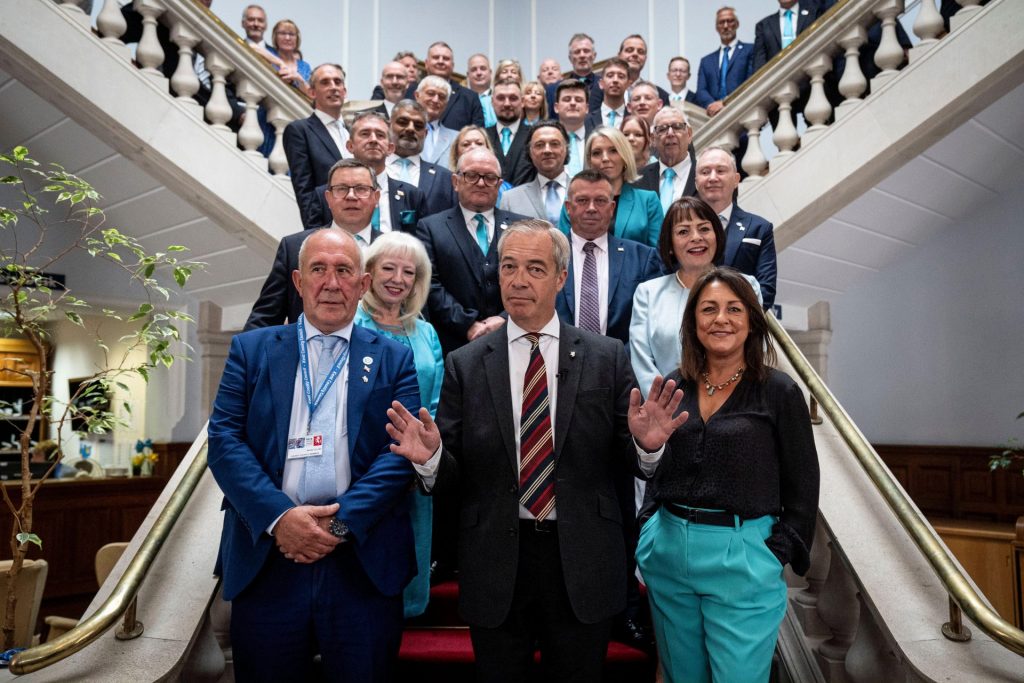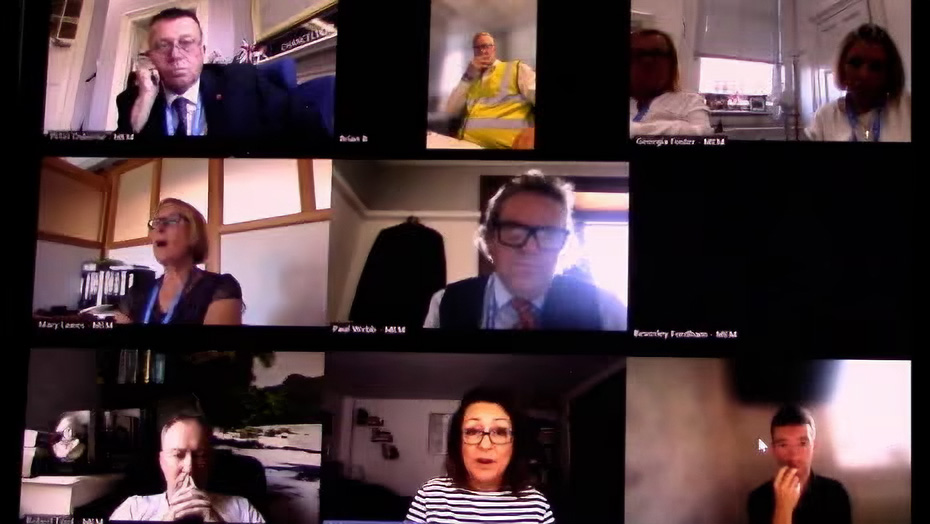Outside County Hall, on Maidstone High Street in Kent, people are hurrying past buskers while a shopkeeper and his customer argue over a phone repair. And then there’s me. For an hour, I have been asking shoppers what they make of their new council administration, but almost nobody wants to answer.
Some shrug, saying they’re “not into politics.” Others wave a hand and keep walking. There is no great sense of betrayal, only the quiet indifference of people who expected nothing and got it.
These are people who are currently living with the rolling disaster of a Reform-led county council – one I have been following at close range. The meltdown of what was supposed to be his party’s flagship council is a deep embarrassment to Nigel Farage, and is already being used by his opponents as an example of what would happen on a wider scale if he won a general election. “Nigel knows we are a shop window,” the combative council leader Linden Kemkaran has said.
Everyone around here has seen the video that makes clear the full extent of the dysfunction. It has brought Kemkaran – a former BBC News employee, another institution under fire – to national attention.
A meeting of Reform councillors was filmed by one of their own and leaked to the Guardian. The film is like a window into political turmoil, one in which Kemkaran tells colleagues: “when it comes to making really big decisions… I’m afraid you’re just going to have to fucking suck it up, OK? Because I am the democratically elected leader.”
The leak turned an already uneasy situation into something approaching a Reform Party civil war. The story appeared on a Saturday, there were suspensions on Monday, and by the end of the week, two councillors had been expelled. A third has since gone, too. Meanwhile Kent County Council, the largest local authority in England, Reform’s flagship, is sinking.
I have been covering local politics in Kent since 2021 and have been reporting on Reform’s activities there for over a year. When the party swept to power in the May local elections, winning 57 of 81 seats, it billed itself as the antidote to complacent politics.
The pledge was clear: cut waste, balance the books, tell hard truths. It was the party’s first serious taste of power anywhere in Britain, which it won promising “efficiency” and “common sense,” with a commitment to “doing more with less.”
Five months later, those slogans have collided with reality. The machinery of local government – budget timetables, statutory duties, risk registers – has proved a far harder opponent than the routed Tories.
Hardly any of the newly elected Reform councillors had experience of local government. Among their ranks were decorators, landlords, gas engineers, teachers, a carpet-store owner, a photographer and a paramedic. A surprising number listed no other source of income at all – they are not retirees, but people of working age. They found themselves overseeing a council budget of £2.6bn.
One officer told me about a confused start. Meetings were cancelled. There was little communication. The administration had to begin by learning what a council does. The officer said early briefings were “poorly handled” and that the first two months were dominated by uncertainty about who was in charge of what.
In place of steady leadership there was theatre. The new administration announced an Elon Musk-inspired Department of Local Government Efficiency (DOLGE), to scour the council’s books for wasteful spending. It promptly scrapped the council’s 2019 climate-emergency declaration, a symbolic act that consumed hours of council time and ended up with protesters chanting outside County Hall.
During the climate debate, Reform councillors rambled about sinister “15-minute cities” and other supposed threats, a nod to conspiracy theories that have gained traction on the party’s fringes.
Richard Palmer, the chair, had opened the meeting by chastising members for their behaviour at the July session, complaining that councillors had stormed out, slammed doors and used “foul and abusive language”. But the call for civility lasted only minutes. Kemkaran accused a Green councillor of arriving at a meeting about violence against women and girls with “six-foot men pretending to be women”. Then she suggested another’s scarf made him “a supporter of Hamas”.
Suggested Reading

How Reform’s Nathan Gill became a Russian agent
In private, Reform’s plans were falling apart. When the Financial Times reported that it was likely to raise council tax next year by the maximum of 5% because a savings drive had failed, Kemkaran dismissed it as “banter” overheard by a journalist. Yet her own cabinet colleague, Diane Morton, admitted services were “down to the bare bones.” Behind the scenes, I was told the budget process was weeks behind schedule. “There’s been too much focus on flag-waving for policies that don’t impact the budget,” said one officer.
A decision to stay in the crumbling Sessions House, the council’s historic base in Maidstone, became a symbol of the new administration’s approach. The previous Tory leadership had planned to sell the ageing building and move staff into cheaper, modern offices nearby, citing rising maintenance costs.
Reform reversed that plan within weeks of taking office, saying it would save money in the short term. Opposition councillors warned that millions would still be needed to keep the Victorian complex functional, so the saving was cosmetic. Inside County Hall, many saw the move as a gesture rather than a serious attempt to deal with the council’s long-term property costs.

Then came rows over behaviour. In October, cabinet member David Wimble called a resident a “fuckwit” under an official council Facebook post about debt reduction. The message stayed up for days. No apology followed. Wimble himself is a veteran of shifting political allegiances, having moved from independent to Conservative to Reform. He also publishes The Looker, a Romney Marsh community paper unusually sympathetic to the party he now represents.
Next, five Reform councillors were photographed smiling beside a man draped in a neo-Nazi flag at an anti-immigration protest. The council offered no comment. Another was found to have posted anti-Muslim memes and praise for Tommy Robinson on social media. There was no statement on that either.
When a journalist covering a far right protest in Canterbury was taunted with a bag of what organisers claimed was used toilet paper, two senior Reform councillors liked the footage online. Kemkaran issued no public rebuke for any of this behaviour. The leadership’s silence hardened the perception of a group unable, or unwilling, to police its own.
Farage, whose political showmanship carried the movement into Kent, said nothing either. Despite owning three homes in the county, Farage has stayed out of local politics since the election, surfacing only in a brief summer appearance at County Hall before retreating to the national stage.
By autumn, the Reform administration’s grip was visibly slipping. The “suck it up” video tore open weeks of private resentment. On it, councillor Paul Thomas can be seen asking whether backbenchers were being asked to support the leadership without knowing what they were being told to back. “I’m on holiday this week, Paul,” Kemkaran replied, sounding irritated, before warning him she would mute him if he continued.
As she spoke, deputy leader Brian Collins could be seen laughing. “It’s all right Brian, you keep laughing your head off, mate,” Thomas shot back. He was muted.
Another councillor, Dean Burns, stepped in: “Let’s face it,” he said, “the situation at the moment with regards to our group is not great.” He described “a lot of back-biting going on,” which he said “tends to be coming from the top down”. He added that he had “worked my arse off in my own portfolio,” but still felt as if he was “getting a rod up my backside all the time”.
The fallout from the leak was immediate. Within 48 hours, four councillors – Paul Thomas, Oliver Bradshaw, Bill Barrett and Maxine Fothergill – were suspended. Robert Ford, already suspended pending a misconduct investigation, was expelled a few days later alongside Barrett. Soon after, three more – Brian Black, Thomas and Bradshaw – were also expelled, accused by Reform headquarters of showing “a pattern of dishonest and deceptive behaviour.”
Isabella Kemp, who represented Sheppey and also worked at Reform’s national HQ, was suspended, then expelled. She says she will take legal action over what she calls unfair dismissal. Burns, who was heard in the leaked video criticising “back-biting” in the group, has since quietly left his deputy cabinet role, with the party confirming only that “he is no longer in post”.
Barrett told the Local Democracy Reporting Service that the leadership was toxic. He made allegations about bullying and claimed eight formal complaints had been lodged against Kemkaran and her deputies. “The reality is KCC at the moment is run by three incompetent individuals,” he said.
Reform’s HQ denies that any evidence of bullying had been found. But the numbers tell their own story. In five months, the group has lost or suspended nine councillors. A 57-seat group had been reduced to 48. The administration still controls the chamber, but its authority is starting to look fragile.
Officials describe an atmosphere of frustration rather than fear. “The mood had settled slightly until the latest stories,” one said. “Now there’s almost gallows humour, wondering which one will go next.” The council’s outgoing chief executive, Amanda Beer, has held repeated meetings to reassure staff, something she “never would have had to do under a previous administration”.

At the council’s most recent meeting on November 6, journalists found the press benches closed and were forced into a public gallery so small that several didn’t get in. When tempers flared, opposition councillors likened proceedings to an episode of The Traitors.
Opposition parties, marginal by numbers, have become spectators. But their leaders describe a system creaking under the strain. Green leader Mark Hood says things “could not have gone much worse,” with meetings cancelled for weeks after the election and some council committees still not restarted.
He said that the administration appeared “entirely reactive,” continuing Conservative-era outsourcing and “renewing contracts rather than bringing services in-house to control cost.” Kemkaran, he added, “seems incapable of collaboration or seeking consensus as she prefers to use conflict and culture-war issues to attract headlines.”
Most of the council, Hood said, now runs itself. “What really worries us is the administration’s inexperience and their ignorance of the unintended consequences of the cuts they will need to make, which could cost more in the long run.” He added: “Some of those who voted Reform have buyers’ regret now they are seeing the impact and chaos.”
The unrest has already damaged Kent’s relations with other authorities. Vince Maple, Labour leader of Medway Council, Kent’s only other upper-tier authority, publicly accused Kemkaran of acting in bad faith over local government reorganisation and described her remarks about “a shocking level of ignorance” among other leaders as “pretty disrespectful.” A proposed joint funding deal to save the county’s tourism and investment agencies fell apart soon after.
Meanwhile, the Kent and Medway Fire and Rescue Authority has been left unable to function after the suspension of five Reform members, including its chair and vice-chair. The Fire Brigades Union called the situation “a shambles and a threat to public safety,” warning that key safety programmes and spending decisions are now in effect frozen.
By late October, Reform’s own councillors were filing complaints to its London headquarters about “a culture and a leadership style” that left backbenchers sidelined. A statement of support for Kemkaran soon circulated, and was signed by 37 of the group’s remaining councillors. For a party that campaigned on transparency and discipline, the response was striking.
Not every Reform member at County Hall has lost focus. Some, like the cabinet member for adult social care, Diane Morton, have earned respect for their candour and work ethic. “She really seems to have a passion for her brief,” the officer told me. “She’s been honest about the pressures the council faces.”
But that honesty only highlights the central problem: arithmetic. More than half of Kent’s budget is locked into adult social care, children’s services and special needs education, areas that cannot legally be cut. That has led directly to the question of tax. Every one-percentage-point rise in council tax raises about £10m, and every council in England faces the same trap: raise to the limit and stand still, or refuse and face insolvency.
That, ultimately, is what Reform UK has discovered. Governing is not about opinions, but about maths. The party promised to make government leaner and freer, but having got into power, Reform’s ideology is useless when it comes to the budgetary arithmetic of social care combined with the weight of public expectation.
For most residents, dysfunction doesn’t look like shouting at meetings. It looks like longer waits for social care assessments, special needs support plans stuck in limbo, and roads left to crumble.
Kent’s multibillion-pound budget touches almost every household, from school meals to foster placements, and when leadership turns inward, those services start to fray. Officers can absorb the shock for a while, but the warning signs are familiar: missed budget deadlines, departments competing for dwindling funds, morale ebbing away. When that happens, trust in local government starts to erode, and it becomes increasingly hard to do the quiet work that holds a county together.
That might be the real lesson I have learned here in Kent, from following the Reform council’s troubles over the past few fraught months. The danger isn’t only that populists struggle to govern, but that their failures drain the institutions beneath them. When politics turns inward, services don’t stop overnight; they simply wear down, until the damage becomes too deep to mend.
Five months in, the Kent experiment looks less like a showcase than a mirror. It reflects every pressure that local government faces, amplified by inexperience and infighting. It shows what happens when a protest movement inherits an institution built for process, and finds itself swallowed by it.
At a recent Prime Minister’s Questions, Keir Starmer told the Commons that “Kent County Council was supposed to be the blueprint for what Reform would deliver around the country. Now we can see what that means – cutting local services, raising council tax and failing to protect the public. All they have to offer is grievance and division.” Starmer has many problems of his own – but this criticism of Reform is hard to dismiss, especially viewed from close quarters.
What began with declarations of discipline and common sense has drifted into suspension notices and private complaints. The machinery of the council keeps moving, indifferent to who sits at the top. Reform is still in charge, at least on paper, but much of its authority now exists only in theory.
If, as the prime minister suggests, this is Reform’s model for government, Kent may have provided Britain with a warning.
Ed Jennings is the editor of Local Authority News and Kent Current News



